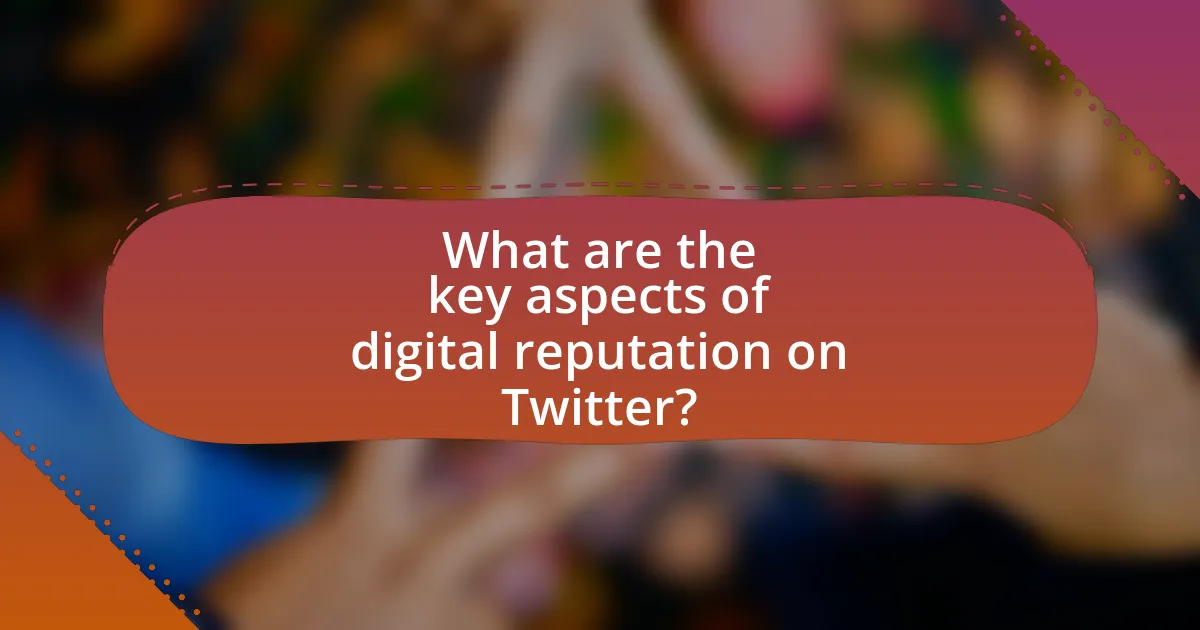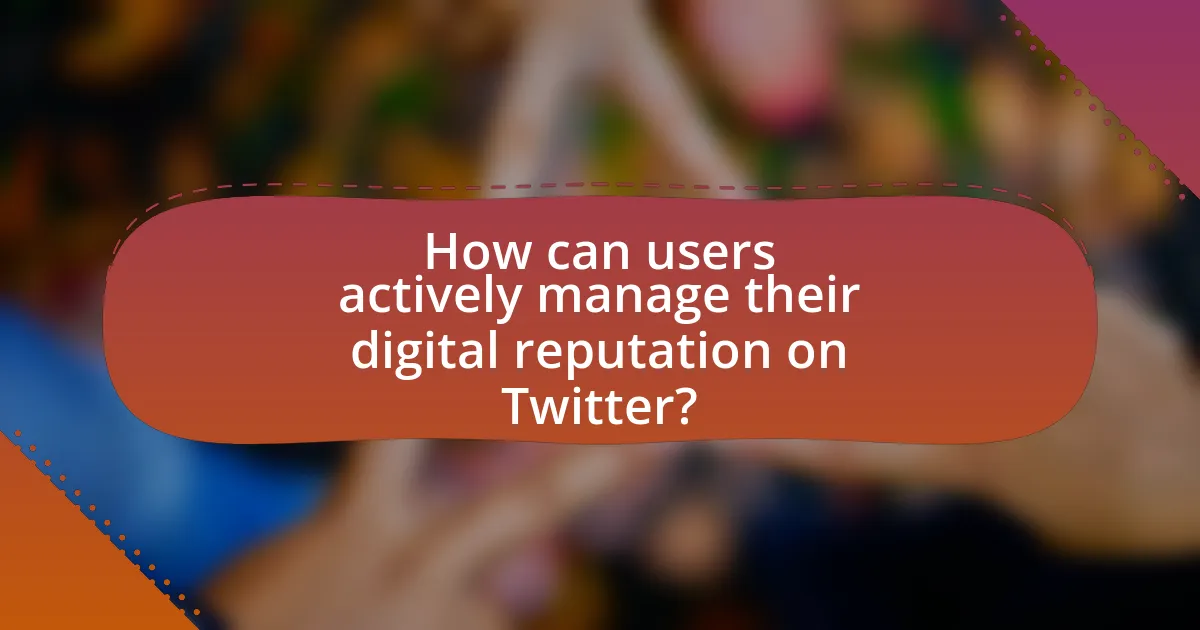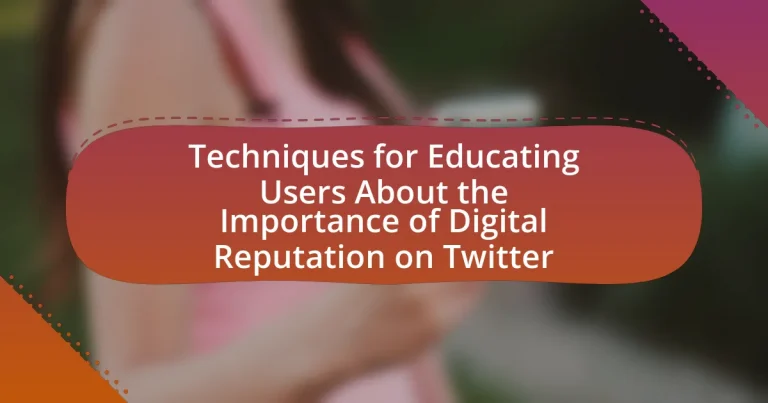The article focuses on the significance of digital reputation on Twitter and outlines techniques for educating users about its importance. Key aspects of digital reputation include user engagement, content quality, follower count, and interaction history, all of which influence how individuals and brands are perceived. The article emphasizes the impact of digital reputation on personal and professional opportunities, the risks associated with a poor reputation, and strategies for users to assess and manage their online presence effectively. Additionally, it discusses the role of workshops, online courses, and social media campaigns in raising awareness and understanding of digital reputation management.

What are the key aspects of digital reputation on Twitter?
The key aspects of digital reputation on Twitter include user engagement, content quality, follower count, and interaction history. User engagement is crucial as it reflects how actively users participate in conversations, with metrics such as likes, retweets, and replies serving as indicators of reputation. Content quality matters because informative, relevant, and original tweets enhance credibility and attract a positive following. Follower count is significant; a higher number of followers often correlates with perceived authority and influence within a niche. Interaction history, including the nature of past interactions with others, shapes how users are viewed, with positive exchanges fostering a favorable reputation. These aspects collectively influence how individuals and brands are perceived on the platform, impacting their overall digital reputation.
Why is digital reputation important for users on Twitter?
Digital reputation is important for users on Twitter because it influences their credibility, opportunities, and interactions on the platform. A positive digital reputation can enhance a user’s ability to connect with others, gain followers, and establish authority in their field. According to a study by the Pew Research Center, 70% of Twitter users report that they are more likely to engage with accounts that have a positive reputation, highlighting the direct impact of digital reputation on user engagement and networking opportunities.
How does digital reputation impact personal and professional opportunities?
Digital reputation significantly influences personal and professional opportunities by shaping perceptions and decisions made by others. A positive digital reputation can lead to job offers, networking opportunities, and collaborations, as employers and peers often research candidates online before making decisions. For instance, a survey by CareerBuilder found that 70% of employers use social media to screen candidates, highlighting the importance of maintaining a favorable online presence. Conversely, a negative digital reputation can result in lost opportunities, as unfavorable online content can deter potential employers and clients. Thus, managing one’s digital reputation is crucial for maximizing personal and professional prospects.
What are the potential risks of a poor digital reputation on Twitter?
A poor digital reputation on Twitter can lead to significant risks, including loss of credibility, decreased engagement, and potential financial repercussions. When individuals or brands are perceived negatively, their credibility diminishes, making it difficult to establish trust with followers and potential customers. Research indicates that 84% of consumers trust online reviews as much as personal recommendations, highlighting the impact of reputation on consumer behavior. Additionally, decreased engagement can result from negative perceptions, as users are less likely to interact with content from accounts they view unfavorably. This disengagement can lead to reduced visibility and reach, ultimately affecting business performance. Furthermore, companies with a tarnished reputation may face financial losses, as 60% of consumers have reported avoiding a brand due to negative online feedback. These factors collectively underscore the importance of maintaining a positive digital reputation on Twitter.
How do users typically perceive their digital reputation?
Users typically perceive their digital reputation as a reflection of their online identity and credibility. This perception is influenced by the content they share, their interactions with others, and the feedback they receive on social media platforms like Twitter. Research indicates that 70% of employers use social media to screen candidates, highlighting the importance of maintaining a positive digital reputation. Users often recognize that their online presence can impact personal and professional opportunities, leading them to be more cautious about their digital footprints.
What factors influence users’ perceptions of their digital reputation?
Users’ perceptions of their digital reputation are influenced by several key factors, including online behavior, content shared, and interactions with others. Online behavior, such as frequency of posting and engagement with followers, shapes how users are viewed; for instance, consistent positive interactions can enhance reputation. The type of content shared, whether informative, entertaining, or controversial, also plays a significant role; research indicates that 70% of users are influenced by the quality of content in forming opinions about an individual’s digital persona. Additionally, interactions with others, including responses to comments and the nature of conversations, can either bolster or damage a user’s reputation, as negative interactions can lead to a decline in perceived credibility.
How can users assess their current digital reputation on Twitter?
Users can assess their current digital reputation on Twitter by analyzing their engagement metrics, follower interactions, and sentiment analysis of their tweets. Engagement metrics, such as likes, retweets, and replies, provide insight into how users perceive and respond to content. For instance, a high number of retweets indicates that followers find the content valuable or relatable. Additionally, monitoring follower interactions, including direct messages and mentions, helps users gauge their influence and the nature of their relationships on the platform. Sentiment analysis tools can further evaluate the emotional tone of mentions and replies, revealing whether the overall sentiment is positive, negative, or neutral. These combined methods offer a comprehensive view of a user’s digital reputation on Twitter.
What techniques can be used to educate users about digital reputation?
Techniques to educate users about digital reputation include interactive workshops, online courses, and social media campaigns. Interactive workshops allow participants to engage in discussions and activities that highlight the impact of online behavior on reputation. Online courses provide structured learning, often incorporating real-world examples and case studies to illustrate the consequences of digital actions. Social media campaigns leverage platforms like Twitter to disseminate information quickly, using infographics and short videos to capture attention and convey key messages about maintaining a positive digital presence. These methods have been shown to increase awareness and understanding of digital reputation, as evidenced by studies indicating that users who participate in educational programs are more likely to adopt responsible online behaviors.
How can social media campaigns raise awareness about digital reputation?
Social media campaigns can raise awareness about digital reputation by actively engaging users through informative content and interactive discussions. These campaigns utilize platforms like Twitter to disseminate valuable information regarding the impact of online behavior on personal and professional reputations. For instance, statistics show that 70% of employers use social media to screen candidates, highlighting the importance of maintaining a positive digital presence. By sharing tips, success stories, and real-life examples, social media campaigns can effectively educate users on how their online actions influence their digital reputation.
What role do influencers play in educating users about digital reputation?
Influencers play a crucial role in educating users about digital reputation by leveraging their platforms to disseminate information and best practices. They often share insights on how online behavior impacts personal and professional image, thereby raising awareness among their followers. For instance, studies show that 70% of young adults trust influencers more than traditional celebrities, making influencers effective in shaping perceptions about digital presence. By discussing topics such as privacy settings, the permanence of online posts, and the implications of digital footprints, influencers provide valuable guidance that helps users navigate their online identities responsibly.
What strategies can enhance users’ understanding of digital reputation?
To enhance users’ understanding of digital reputation, implementing educational campaigns that focus on the implications of online behavior is essential. These campaigns can utilize real-life case studies demonstrating the long-term effects of digital footprints, such as instances where individuals faced professional repercussions due to inappropriate social media posts. Research indicates that 70% of employers use social media to screen candidates, highlighting the importance of maintaining a positive online presence. Additionally, providing interactive workshops that teach users how to manage their online profiles and privacy settings can further solidify their understanding of digital reputation.
How can workshops and seminars be effective in educating users?
Workshops and seminars can be effective in educating users by providing interactive, hands-on experiences that enhance learning retention. These formats allow participants to engage directly with the material, ask questions, and practice skills in real-time, which has been shown to improve understanding and application of concepts. Research indicates that active learning techniques, such as those used in workshops and seminars, can lead to a 20% increase in knowledge retention compared to traditional lecture-based methods. Additionally, the collaborative environment fosters peer learning and networking, further enriching the educational experience.
What topics should be covered in workshops focused on digital reputation?
Workshops focused on digital reputation should cover topics such as understanding digital footprints, managing online privacy settings, the impact of social media on reputation, strategies for positive online engagement, and techniques for responding to negative feedback. Understanding digital footprints is crucial as it highlights how online actions contribute to one’s overall reputation. Managing online privacy settings empowers users to control their information visibility, while the impact of social media on reputation emphasizes the need for careful content sharing. Strategies for positive online engagement teach users how to build a favorable image, and techniques for responding to negative feedback provide essential skills for damage control. These topics collectively equip participants with the knowledge to navigate and enhance their digital reputation effectively.
How can interactive activities improve learning about digital reputation?
Interactive activities enhance learning about digital reputation by engaging users in practical scenarios that simulate real-life online interactions. These activities, such as role-playing or gamified assessments, allow participants to experience the consequences of their digital actions firsthand, reinforcing the importance of maintaining a positive online presence. Research indicates that experiential learning, which includes interactive methods, significantly improves retention and understanding of complex subjects, including digital reputation management. For instance, a study published in the Journal of Educational Psychology found that students who participated in interactive learning environments demonstrated a 30% increase in knowledge retention compared to traditional learning methods. This evidence supports the effectiveness of interactive activities in educating users about the significance of their digital reputation on platforms like Twitter.
What online resources are available for users to learn about digital reputation?
Online resources available for users to learn about digital reputation include websites, online courses, and social media platforms. Websites such as Reputation.com and BrandYourself offer comprehensive guides and tools for managing online reputation. Online courses on platforms like Coursera and Udemy provide structured learning on digital reputation management, often featuring expert instructors and real-world case studies. Additionally, social media platforms like LinkedIn and Twitter host discussions and articles from industry professionals, offering insights into best practices for maintaining a positive digital reputation. These resources collectively equip users with the knowledge and skills necessary to navigate and enhance their online presence effectively.
Which websites and platforms provide valuable information on digital reputation?
Websites and platforms that provide valuable information on digital reputation include Reputation.com, BrandYourself.com, and Trustpilot.com. Reputation.com offers tools for managing online reviews and improving brand image, while BrandYourself.com focuses on personal branding and reputation management for individuals. Trustpilot.com serves as a review platform where businesses can monitor customer feedback, which is essential for understanding and enhancing digital reputation. These platforms are widely recognized for their effectiveness in helping users navigate and improve their online presence.
How can users utilize online courses to enhance their understanding?
Users can utilize online courses to enhance their understanding by engaging with structured content that covers specific topics in depth. Online courses often provide expert-led instruction, interactive elements, and assessments that reinforce learning. For instance, a course on digital reputation management can offer case studies, real-world examples, and practical exercises that help users grasp the nuances of maintaining a positive online presence. Research indicates that learners who participate in online courses demonstrate improved retention of information and application of skills, as evidenced by a study from the Online Learning Consortium, which found that 70% of students reported increased knowledge after completing online courses.

How can users actively manage their digital reputation on Twitter?
Users can actively manage their digital reputation on Twitter by regularly monitoring their mentions and interactions. This involves using Twitter’s search function and notifications to track conversations about themselves, allowing them to respond promptly to any negative comments or misinformation. Additionally, users should curate their profiles by sharing positive content, engaging with their audience, and maintaining a consistent tone that reflects their values. Research indicates that 70% of employers use social media to screen candidates, highlighting the importance of a positive online presence. By being proactive in these areas, users can shape their digital reputation effectively.
What best practices should users follow to maintain a positive digital reputation?
To maintain a positive digital reputation, users should consistently monitor their online presence, engage respectfully with others, and share valuable content. Regularly checking search results and social media profiles helps users identify and address any negative information. Engaging respectfully fosters a positive community image, while sharing valuable content positions users as knowledgeable and trustworthy. According to a 2021 survey by the Pew Research Center, 70% of adults believe that online behavior significantly impacts personal reputation, highlighting the importance of these practices.
How can users effectively monitor their online presence?
Users can effectively monitor their online presence by utilizing tools such as Google Alerts, social media monitoring platforms, and regular self-searches. Google Alerts allows users to receive notifications when their name or specific keywords are mentioned online, enabling timely awareness of new content. Social media monitoring platforms, like Hootsuite or Brandwatch, provide insights into mentions and sentiment across various platforms, helping users gauge public perception. Regular self-searches on search engines can reveal what information is publicly accessible about them, allowing for proactive management of their digital reputation. According to a 2021 survey by the Pew Research Center, 70% of adults have taken steps to manage their online presence, highlighting the importance of active monitoring.
What steps can users take to respond to negative feedback or comments?
Users can respond to negative feedback or comments by acknowledging the issue, expressing empathy, and providing a solution. Acknowledging the feedback shows that users value the opinions of others, which can help de-escalate the situation. Expressing empathy allows users to connect with the commenter, demonstrating understanding of their feelings. Providing a solution or offering to resolve the issue can turn a negative experience into a positive interaction. Research indicates that 70% of customers who receive a response to their complaint are more likely to recommend the brand, highlighting the effectiveness of these steps in managing digital reputation on platforms like Twitter.
What common mistakes should users avoid regarding their digital reputation?
Users should avoid oversharing personal information online, as it can lead to identity theft and privacy breaches. Sharing sensitive details such as addresses, phone numbers, or financial information can make individuals vulnerable to cybercriminals. Additionally, users should refrain from engaging in negative interactions or arguments on social media, as these can tarnish their reputation and lead to a negative perception by peers and potential employers. Research indicates that 70% of employers use social media to screen candidates, highlighting the importance of maintaining a professional online presence. Lastly, users should not ignore privacy settings; failing to utilize these tools can result in unwanted exposure of personal content to a wider audience than intended.
How can oversharing impact a user’s digital reputation?
Oversharing can significantly damage a user’s digital reputation by exposing personal information that may be misinterpreted or misused. When users share excessive details about their lives, they risk creating a negative perception among peers, employers, and the public, as this information can be easily accessed and scrutinized. For instance, a study by CareerBuilder found that 70% of employers use social media to screen candidates, and 57% of them have found content that caused them to reconsider a candidate. This highlights how oversharing can lead to lost job opportunities and tarnished professional relationships.
What are the consequences of engaging in online conflicts?
Engaging in online conflicts can lead to significant negative consequences, including damage to one’s digital reputation, emotional distress, and potential legal repercussions. Research indicates that individuals involved in online disputes often experience increased anxiety and depression, as highlighted in a study published in the Journal of Cyberpsychology, Behavior, and Social Networking, which found that 70% of participants reported emotional distress after engaging in online arguments. Additionally, online conflicts can result in a tarnished public image, as negative interactions are often permanent and easily accessible, impacting personal and professional relationships. Furthermore, in some cases, online conflicts can escalate to legal issues, such as defamation claims, which can have serious financial and reputational consequences.
What practical tips can help users improve their digital reputation on Twitter?
To improve their digital reputation on Twitter, users should consistently engage with their audience by sharing valuable content and responding to comments. Engaging positively with followers fosters a sense of community and trust, which is essential for a good reputation. Additionally, users should monitor their mentions and direct messages to address any concerns or feedback promptly, demonstrating responsiveness and care for their audience. Regularly reviewing and updating privacy settings can also help users control their online presence and protect their reputation. Furthermore, users should avoid controversial topics and negative interactions, as these can lead to a tarnished image. Research indicates that 70% of employers use social media to screen candidates, highlighting the importance of maintaining a positive digital footprint.
How can users create a consistent and positive online persona?
Users can create a consistent and positive online persona by curating their content, engaging authentically, and maintaining a coherent visual identity across platforms. Curating content involves sharing relevant and valuable information that aligns with their interests and values, which helps establish expertise and credibility. Engaging authentically with followers through genuine interactions fosters trust and builds a supportive community. Maintaining a coherent visual identity, such as using consistent profile pictures and color schemes, reinforces brand recognition. Research indicates that 70% of employers use social media to screen candidates, highlighting the importance of a positive digital reputation in professional contexts.
What role does engagement with followers play in building a strong digital reputation?
Engagement with followers is crucial for building a strong digital reputation as it fosters trust and loyalty. When brands or individuals actively interact with their audience through responses, likes, and shares, they create a sense of community and connection. This interaction not only enhances visibility but also encourages positive word-of-mouth, which is essential for reputation management. Research indicates that 70% of consumers are more likely to recommend a brand with which they engage on social media, highlighting the direct correlation between follower engagement and reputation strength.


